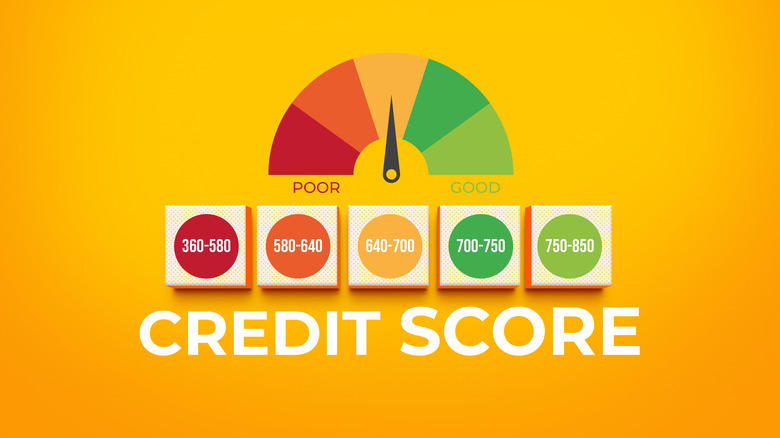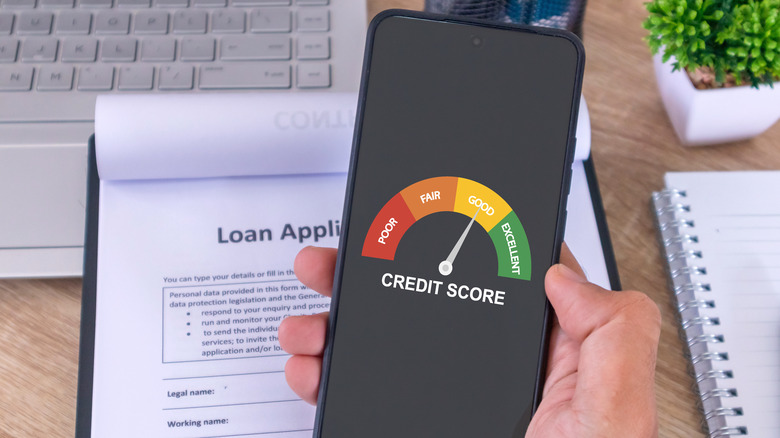Once You Hit This Credit Score, You'll Qualify For The Best Loans
When your credit score gets to 800, lenders will see you as a top borrower. FICO refers to scores at or above 800 as "Exceptional" — and with this score you are far more likely to get the lowest interest rates and fees available on things like mortgages, credit cards, and other types of loans. According to February 2024 data from Bankrate, this can reduce how much interest you will eventually pay on conventional, Federal Housing Administration (FHA), and Veterans Affairs (VA) loans.
If you want to know what your current credit score can get you, the Consumer Financial Protection Bureau has a tool that can help you learn what interest rates are available to you based on your score. Lenders look at your credit score, but they also check other details before approving a loan — your income, your total debt, how much money you can put down, the type of loan you want, and the number of years you plan to pay it back. All of these things can help a lender decide if you are a solid candidate for the loan — and what your interest rate will be. This is why it helps to grow your credit score in your 20s, and to take advantage of tips that can build your credit fast.
What an 800 credit score does for you
As of August 2025, a person with a credit score above 740 can get a rate of 6.57% on a 30-year mortgage, according to Federal Reserve Economic Data (FRED). If they have a score from 720 to 739, they can get 6.68%, or 6.69% if their score is between 700 to 719. On a $400,000 loan paid over 30 years, a person with the 6.57% rate would pay roughly $2,549 each month, while the person with a 6.69% rate would pay $2,579 — a difference of about $30 every month. However, in a year that totals over $360, or $1,810 in five years, or $3,620 in 10 years. In 30 years, this can cost an additional almost $11,000. For those with lower credit, you might be amazed to learn just how significant a 1% difference in your mortgage rate can affect what you pay.
This is also true for car loans. Per Experian, in June 2025, people with scores between 781 and 850 can get a 5.18% rate when financing a new car purchase or 6.82% on used ones. However, for people with scores between 601 and 660, these rates increased to 9.83% for a new car and 13.74% for a used one. If you borrow $35,000 to buy a new car, and pay it off over five years, you would pay $663 per month with a score over 781. Meanwhile, if your score is between 601 to 660, your monthly payment would be closer to $740. That's $77 more per month, adding up to an extra $4,640 over those five years.
How to increase your credit score
To get the best credit, it's important to pay your bills on time. Credit scores are affected most by your payment history, and missing even one can hurt your score. Next, try to keep the amount you owe on your credit cards low, since your credit utilization also plays a significant role in your credit score. The Consumer Financial Protection Bureau says it's best to stay under 30% utilization of your credit limit, but many people aim to keep their balances even lower. One way to do this is to pay down your balance before your billing statement comes out. You can also ask for a higher credit limit if you're confident you won't overspend.
Also, avoid applying for too many new loans or credit cards at once. Each application can cause a drop in your score. If shopping for a car, home, or student loan, do it within a 45-day window so that any hard credit inquiry hits will only count as one. Also, consider keeping your older credit card lines open if they're in good standing, because having a longer credit history can also help your score. Similarly, you can boost your score by being added as an authorized user on someone else's well-managed credit card. Lastly, regularly check your credit reports for mistakes, and report or fix anything that looks wrong.


